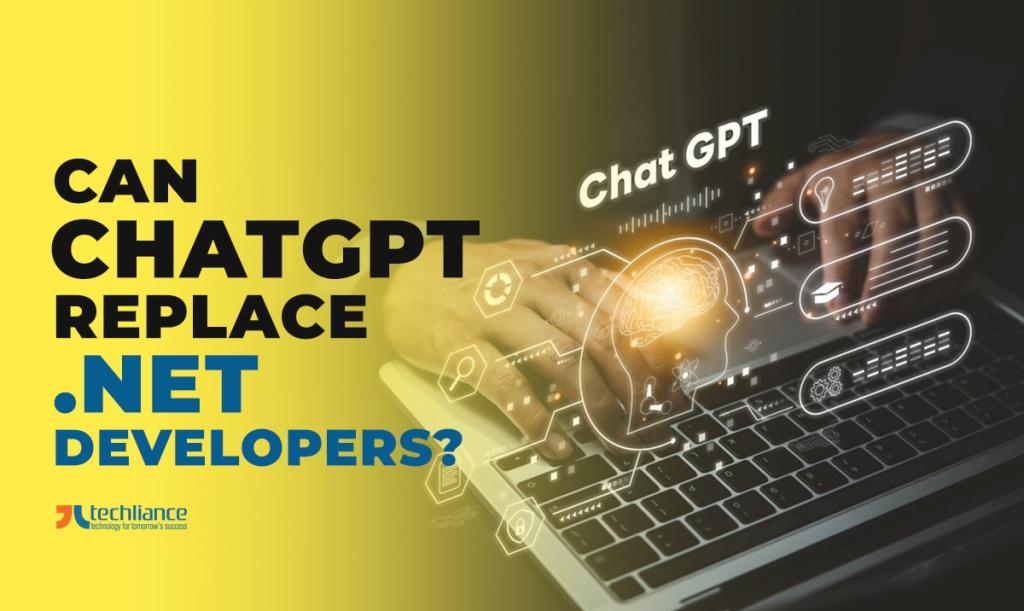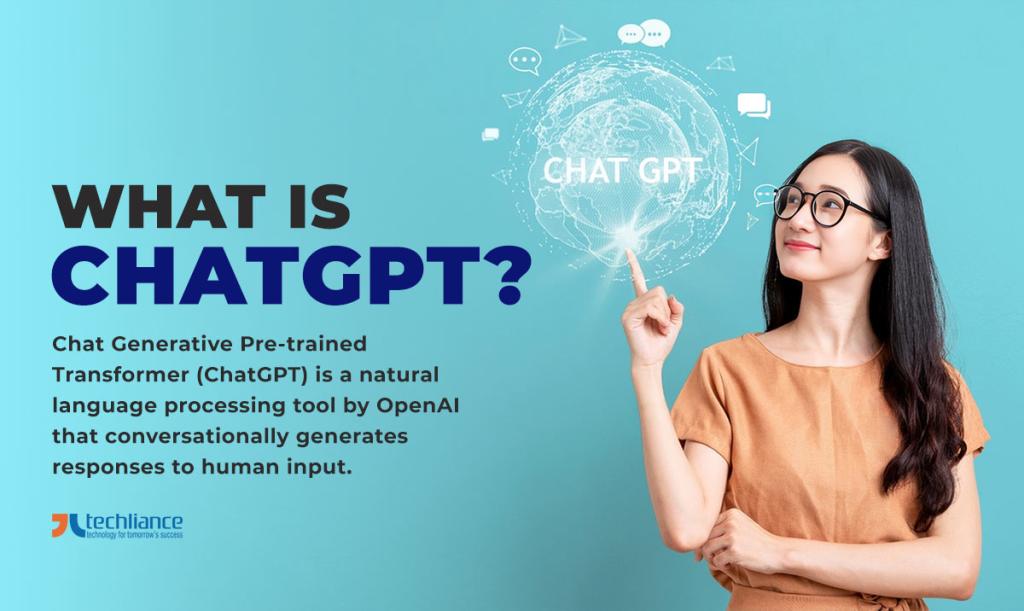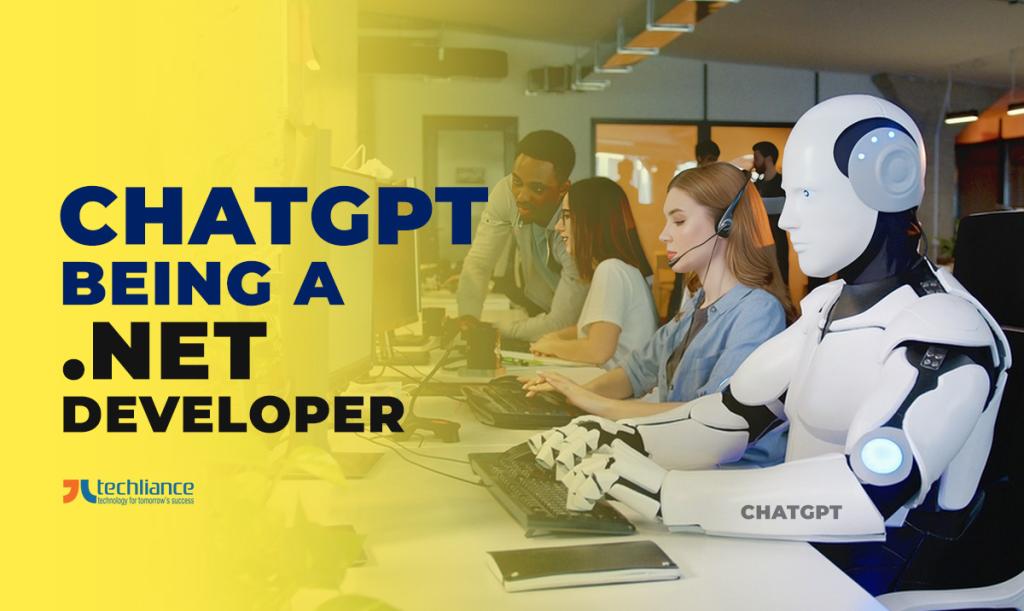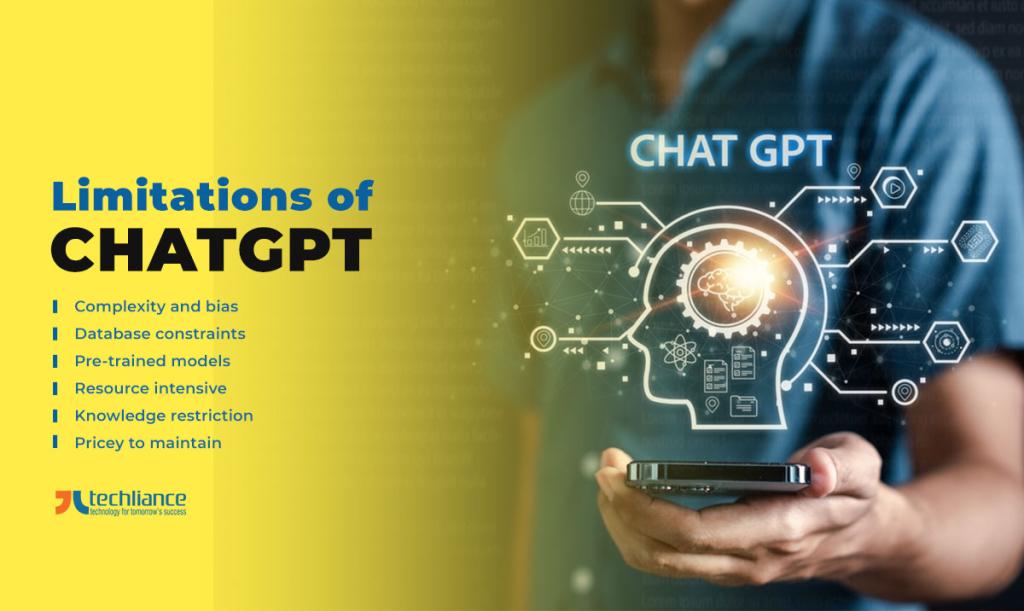Globally and in the United States, people like ChatGPT because it provides an easier way to answer questions. While businesses are using ChatGPT to automate tasks of a simple to complex nature during 2023. This has led to questions like: can ChatGPT replace .NET developers?
AI chatbots like Google Bard and ChatGPT are seemingly threatening everyone’s job. Especially, as ChatGPT is here, it’s not just the talk of the town but a rival for everyone. GPT-4, the next incarnation of GPT-3.5, the underlying technology of ChatGPT, produces even better results.
Artificial intelligence is one of the main protagonists of the revolution. It facilitates tech resources like .NET programmers in more efficient product development. By automating some tasks, they can get more output in less time.

Table of contents
- What is ChatGPT?
- Key takeaways of ChatGPT for .NET developers
- Features of ChatGPT
- Different uses of ChatGPT
- ChatGPT being a .NET Developer
- Limitations of ChatGPT
- Conclusion
- FAQs about ChatGPT
What is ChatGPT?
Chat Generative Pre-trained Transformer (ChatGPT) is a natural language processing tool by OpenAI that conversationally generates responses to human input. Originally built upon GPT-3.5 and GPT-4 language models, ChatGPT is set to support future GPT versions as well. Also, you can utilize it as a tool that employs NLP for creating chatbots for personal and business use cases.
Released as a free research preview prototype in November 2022, ChatGPT is widely embraced by users all over the world. Sometimes, spelled as Chat GPT, it is a sibling language model of InstructGPT by OpenAI. ChatGPT was trained with Reinforcement Learning, supervised fine-tuning, and Proximal Policy Optimization.
ChatGPT (on top of GPT-3) is one of the most advanced NLP models that has taken the world by storm. GPT-4 is already unveiled for the ChatGPT Plus version and is getting riveting reviews. People and businesses are eagerly looking forward to the upcoming versions of ChatGPT.

Key takeaways of ChatGPT for .NET developers
Is an AI tool like ChatGPT suitable for coding? It brings up the next big question about the programming capable tools in 2023 to the fore. Can ChatGPT replace .NET developers?
These are some takeaways for the general public and developers while dealing with ChatGPT.
- People are starting to consider ChatGPT as the Yoda of everything.
- ChatGPT has the most human-like interaction with users through an ML model known as GPT-3 (and GPT-4).
- This allows users to ask questions, and follow up with proper context with a buildup of any conversation.
- It has 300 billion words fed into the database with the biggest question of whether it can replace developers.
- ChatGPT is brilliant, but it cannot be reckoned as a proper .NET developer. You can put ChatGPT to the test for developing an e-commerce application. It starts brilliantly with class model writing, but it becomes stuck while writing controllers and even tests.
- Realize that AI tools and ChatGPT are enabling us to better our game, and are not a threat to developers.
- ChatGPT can serve as an aid or helping tool whenever a developer gets stuck at solving a problem.
Features of ChatGPT
In essence, ChatGPT is a lot of fun and is jam-packed with some amazing features including the following.
- Conversational communication
- Dynamic responses
- Comparative data and ranking-based responses
- In-depth replies
- Asking questions and responding to everything
- Based on more than 300 billion words fed into the database
- Continual learning even as it answers, eventually getting trained to come up with better responses each time
Different uses of ChatGPT
Keep in mind that ChatGPT is a glorious tool with different uses. Moreover, it is not just prevalent in one industry or domain. ChatGPT covers so many scenarios that enable further functions, innovation, creativity, and various other aspects.
That’s why programmers are even employing ChatGPT for coding different types of applications. Its usage is increasing in the healthcare industry, travel industry, hospitality industry, and other business sectors. Especially, powering eCommerce applications, ChatGPT is just the beginning of further possibilities.
ChatGPT is not a robot talking to you. However, it is extremely human-like in conversation and can even allow the translation of words from one language to another. People are even using ChatGPT to write their CVs/resumes.
You get logical answers to your questions so that you can summarize any topic. ChatGPT enables the planning (and creation) of fresh content, and you need not worry about plagiarism. Although, you must fact-check its output and edit it to add a human touch for users.
ChatGPT gives you comprehensive answers. Moreover, it keeps a reference to the previously discussed conversation, so the next follow-up question would have the background. You don’t ask a question in singularity, but it’s a conversation based on the previous context.
The buildup is extremely powerful as it helps you scale down to whatever answer you are looking for. It has already taken up writing assignments to a whole new level. This is why ChatGPT is extensively used for outlining and drafting content of different sorts.
We’ve covered the initial observations about the threat of AI to developers in another article. In this article, we’ll debate ChatGPT’s richness in developing applications on .NET technology. However, a concept so diverse deserves a series of articles to cover different aspects.
ChatGPT being a .NET Developer
Through 2023, businesses are questioning the all-high and mighty position of developers as the main stakeholders for software development. Consider an intriguing case that ChatGPT is told to function as a .NET developer and code an e-commerce application. So, this whole debate is set to make everyone attentive because we’re about to address the elephant in the room.
There are valid concerns, when ChatGPT is told to develop an electronic commerce application using ASPT.NET Core Web API. Perceptibly, ChatGPT is put to the ultimate test where probes are regarding how ChatGPT will approach building it. Checking the performance of ChatGPT in phases like writing code for classes, controllers, and debugging tests is necessary.
Let’s look into these stages of using ChatGPT with ASP.NET to build an eCommerce web app.

Starting off
The primary objective was to create an e-commerce system that can take orders, register customers, and have a product catalog. How did ChatGPT tackle this problem, and what way it chose for building the solution? The roadmap is given below.
- Installing .NET Core SDK
- Creating a new ASP.NET Core Web API project in Visual Studio
- Defining models for orders, customers, and products
- Setting up a database
- Configuring Entity Framework
- Implementing logic for controllers
- Testing the API endpoints
This gave us the feeling that ChatGPT has a proper plan. It was not at all clueless about the overall approach it aims to take, so that was a good start. But then it was just the beginning, now was the time to get down to the nitty-gritty.
Class model writing
The second stage was to code for the class models. ChatGTP wrote classes for Order, Customer, and Product. What was observed was that ChatGPT was able to write proper syntax and even common properties for the entries.
Next, we told ChatGPT to store details about the order items. But it tried to store all items in the Order class instead of creating a separate entity for them. It seemed that ChatGPT was learning through us.
We advised ChatGPT to separate order items into their particular class. Then, it followed our cue by creating a new order item class with properties of ProductID, Quantity, and Price. This way, we were done with class model writing.
Creating controllers
The third stage was coding the controllers. ChatGPT writes a controller with common CRUD methods. Such as reading all orders or a single order; creating, updating, and deleting an order.
ChatGPT created an unspecified interface with little information provided on it as the final result for Orders. Even for the Customer controller, it suddenly stopped in the middle. Perhaps, there were server loading issues, or its capabilities became limited. By now, we had started missing the .NET developers honestly.
Writing debugging tests
Moving on, the fourth stage was to write unit tests using XUnit. ChatGPT did rise to the occasion here. Accordingly, it created a mock object of the IUnitOfWork interface.
It even wrote good unit tests for the controllers. Even, calling the endpoints in the controllers and setting an assert as to what type should be returned. But the behavior of remaining stuck while writing the tests continued.
Solving server issues
This seemed that we had finally got the better of ChatGPT in the fifth stage. As the number of errors kept creeping up with server issues while processing the requests. It became a confusing, bizarre, and overall a frustrating experience for us. We came to a point to call it quits and proceed to just have a relaxing day.
Related: Comparison of .NET framework and .NET Core for everybody
Limitations of ChatGPT
Every time we think of AI and ML, we think of those amazing robots that we’ve seen in sci-fi movies. The ones that do all the tricks and have the capabilities to look just human-like companions. But we forget, ChatGPT is yet evolving and at the current stage has limitations such as these.
- Complexity and bias
- Database constraints
- Pre-trained models
- Knowledge restriction
- Pricey to maintain
- Resource intensive

Next, we take a look at these shortcomings of ChatGPT.
Complexity and bias
ChatGPT is good at breaking down complex concepts. Nevertheless, it can get confusing to give random answers. At times, Generative AI can be wrong too, with biases in information
Database constraints
ChatGPT has an extensive database. At times it can slip on catching real-time languages, experiences, and cultural diversities. Because of this reason, it may come up with responses that are out of context or even inappropriate.
Pre-trained models
ChatGPT is trained by data that is coming from machine learning algorithms. This means that the training may be biased or faulty. We cannot be completely reliant on the correctness of responses that may also have systemic biases.
Knowledge restriction
Keep in mind that ChatGPT has a knowledge cutoff of 2021. It does not fully cover events after September 2021 and can’t access the internet. Also, this restriction of knowledge applies to GPT4.
Pricey to maintain
The estimates of operating costs vary from $1.5 million to $3 million up to $8 million per month. Yikes, just imagine its annual maintenance costs in the long run. Although there is a paid model for the users, ChatGPT will take efforts to become profitable for OpenAI.
Resource intensive
The language model behind ChatGPT is drawing power from many resources. Nevertheless, this could be a limitation for mobile devices or some low-power devices. That’s why OpenAI has to keep intensive resources to keep its AI chatbot running.
Conclusion
It seemed to be too good to be true — and hence it was so. If anything, ChatGPT is amazing at helping you get past confusion, a query, or an important breakthrough for your code. But it’s not the developer you are looking for.
ChatGPT can merely serve as a guide to help you write the code you want to develop for your product. Hence, ChatGPT has great usage in being the go-to source every time you are stuck on a problem. It can give you the much-needed resolution so you can get back to coding.
But imagining it as a resource that replaces a developer is a quite far-fetched idea. For now, ChatGPT is like a consulting aid. It is a tool you can use for referring and getting some ideas that you can use for developing software.
.NET developers, you are safe — but it does not mean you can get complacent. So, keep learning and growing in your skills — you will remain the master and have AI tools follow your lead. Businesses must understand that the answer to “Can ChatGPT replace .NET developers?” is no.
Are you looking for great .NET development but don’t know where to find the right resources? Then, have trust in Techliance to get skillful .NET developer developers. We will help you get the right fit for all your product development needs.
FAQs about ChatGPT
Here are short answers to some frequently asked questions (FAQs) regarding ChatGPT.
Does ChatGPT give the same answer to everyone?
ChatGPT can write essays, poems, code, etc. based on what it is asked to do. Most of the time, when different people ask ChatGPT the same question, they will get the same answer. There may be a few word variations, but they will be almost identical. So the answer is yes.
Is ChatGPT confidential?
There is the possibility that employees may share proprietary, confidential, or trade secret information when having “conversations” with ChatGPT. Although, OpenAI claims that ChatGPT does not retain information given in conversations. However, it does “learn” from every conversation.
What data was ChatGPT trained on?
ChatGPT is built on top of OpenAI’s GPT-3 and GPT-4 families of large language models (LLMs). GPT-3 was fed on 570GB text from Common Crawl (filtered dataset), WebText2, books, and Wikipedia. Its successor GPT-4 is faster, more accurate, and allows image input.
Is ChatGPT a threat to Google?
Irrespective of some problems, the capabilities of ChatGPT have rung alarm bells at Google as a potential threat to business. Google renewed its efforts toward AI development following a “code red” in response to the growing popularity of OpenAI’s chatbot. Big G coming up with Google Bard, plans to use to add AI abilities to its search engine.
Does ChatGPT save conversations?
ChatGPT (free version) and ChatGPT Plus (available for $20 per month) allow you to save the conversations.




